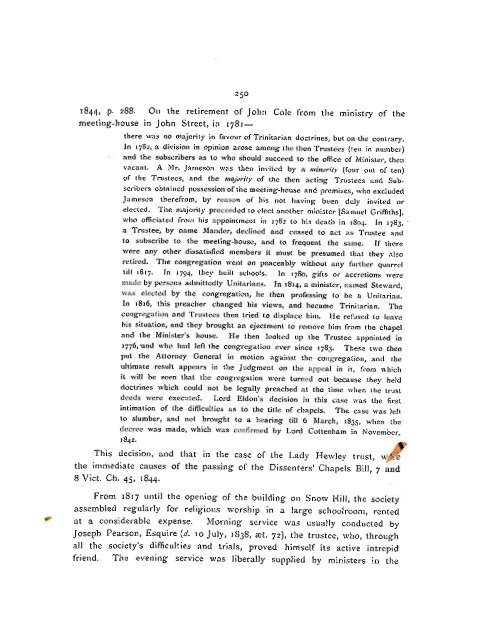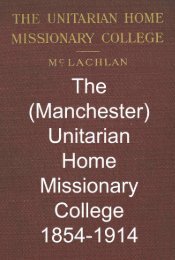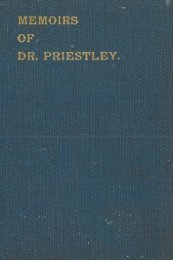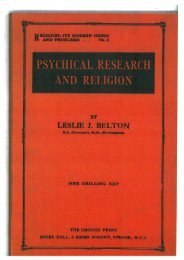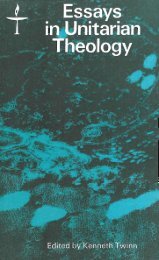Midland Churches: A History of the Congregations on - General ...
Midland Churches: A History of the Congregations on - General ...
Midland Churches: A History of the Congregations on - General ...
Create successful ePaper yourself
Turn your PDF publications into a flip-book with our unique Google optimized e-Paper software.
1844, p. 288. On <str<strong>on</strong>g>the</str<strong>on</strong>g> retirement <str<strong>on</strong>g>of</str<strong>on</strong>g> John Cole from <str<strong>on</strong>g>the</str<strong>on</strong>g> ministry <str<strong>on</strong>g>of</str<strong>on</strong>g> <str<strong>on</strong>g>the</str<strong>on</strong>g><br />
meeting-house in John Street, in 1781-<br />
<str<strong>on</strong>g>the</str<strong>on</strong>g>re was no majority in favour <str<strong>on</strong>g>of</str<strong>on</strong>g> Trinitarian doctrines, but <strong>on</strong> <str<strong>on</strong>g>the</str<strong>on</strong>g> c<strong>on</strong>trary.<br />
In 1782, a divisi<strong>on</strong> in opini<strong>on</strong> arose am<strong>on</strong>g <str<strong>on</strong>g>the</str<strong>on</strong>g> <str<strong>on</strong>g>the</str<strong>on</strong>g>n Trustees (ten in number)<br />
- and <str<strong>on</strong>g>the</str<strong>on</strong>g> subscribers as to who should succeed to <str<strong>on</strong>g>the</str<strong>on</strong>g> <str<strong>on</strong>g>of</str<strong>on</strong>g>fice <str<strong>on</strong>g>of</str<strong>on</strong>g> Minister, <str<strong>on</strong>g>the</str<strong>on</strong>g>n<br />
vacant. A Mr. James<strong>on</strong> was <str<strong>on</strong>g>the</str<strong>on</strong>g>n invited by a nzinoritp, (four out <str<strong>on</strong>g>of</str<strong>on</strong>g> ten)<br />
<str<strong>on</strong>g>of</str<strong>on</strong>g> <str<strong>on</strong>g>the</str<strong>on</strong>g> Trustees, and <str<strong>on</strong>g>the</str<strong>on</strong>g> mujog-ity <str<strong>on</strong>g>of</str<strong>on</strong>g> <str<strong>on</strong>g>the</str<strong>on</strong>g> <str<strong>on</strong>g>the</str<strong>on</strong>g>n acting Trustees and Sub-<br />
scribers obtained possessi<strong>on</strong> <str<strong>on</strong>g>of</str<strong>on</strong>g> <str<strong>on</strong>g>the</str<strong>on</strong>g> meeting-house and premises, who excluded<br />
James<strong>on</strong> <str<strong>on</strong>g>the</str<strong>on</strong>g>refrom, by reas<strong>on</strong> <str<strong>on</strong>g>of</str<strong>on</strong>g> his not having been duly invited or<br />
elected. The majority proceeded to elect ano<str<strong>on</strong>g>the</str<strong>on</strong>g>r minister [Samuel Griffiths],<br />
who <str<strong>on</strong>g>of</str<strong>on</strong>g>ficiated from his appointment in 1782 to his death in 1804. In 1783, '<br />
a Trustee, by name Mander, declined and ceased to act as Trustee and<br />
to subscribe to <str<strong>on</strong>g>the</str<strong>on</strong>g> meeting-house, and to frequent <str<strong>on</strong>g>the</str<strong>on</strong>g> same. If <str<strong>on</strong>g>the</str<strong>on</strong>g>re<br />
were any o<str<strong>on</strong>g>the</str<strong>on</strong>g>r dissatisfied menibers it must be presumed that <str<strong>on</strong>g>the</str<strong>on</strong>g>y also<br />
retired. The c<strong>on</strong>gregati<strong>on</strong> went <strong>on</strong> peaceably without any fur<str<strong>on</strong>g>the</str<strong>on</strong>g>r quarrel<br />
till 1817. In 1794, <str<strong>on</strong>g>the</str<strong>on</strong>g>y built schools. In 1780, gifts or accreti<strong>on</strong>s were<br />
made by pers<strong>on</strong>s admittedly Unitarians. In 1814, a minister, named Steward,<br />
was elected by <str<strong>on</strong>g>the</str<strong>on</strong>g> c<strong>on</strong>gregati<strong>on</strong>, he <str<strong>on</strong>g>the</str<strong>on</strong>g>n pr<str<strong>on</strong>g>of</str<strong>on</strong>g>essing to be a Unitarian.<br />
In 1816, this preacher changed his views, and became Trinitarian. The<br />
c<strong>on</strong>gregati<strong>on</strong> and Trustees <str<strong>on</strong>g>the</str<strong>on</strong>g>n tried to displace him. He refused to leave<br />
his situati<strong>on</strong>, and <str<strong>on</strong>g>the</str<strong>on</strong>g>y brought an ejectn~ent to remove him from <str<strong>on</strong>g>the</str<strong>on</strong>g> chapel<br />
and <str<strong>on</strong>g>the</str<strong>on</strong>g> Minister's house. He <str<strong>on</strong>g>the</str<strong>on</strong>g>n looked up <str<strong>on</strong>g>the</str<strong>on</strong>g> Trustee appointed in<br />
1776;and who had left <str<strong>on</strong>g>the</str<strong>on</strong>g> c<strong>on</strong>gregati<strong>on</strong> ever since 1783. These two <str<strong>on</strong>g>the</str<strong>on</strong>g>n<br />
put <str<strong>on</strong>g>the</str<strong>on</strong>g> Attorney <strong>General</strong> it1 moti<strong>on</strong> against <str<strong>on</strong>g>the</str<strong>on</strong>g> c<strong>on</strong>gregati<strong>on</strong>, and <str<strong>on</strong>g>the</str<strong>on</strong>g><br />
ultimate result appears in <str<strong>on</strong>g>the</str<strong>on</strong>g> Judgment <strong>on</strong> <str<strong>on</strong>g>the</str<strong>on</strong>g> appeal in it, from which<br />
it will be seen that <str<strong>on</strong>g>the</str<strong>on</strong>g> c<strong>on</strong>gregati<strong>on</strong> were turned out because <str<strong>on</strong>g>the</str<strong>on</strong>g>y held<br />
doctrines which could not be legally preached at <str<strong>on</strong>g>the</str<strong>on</strong>g> time when <str<strong>on</strong>g>the</str<strong>on</strong>g> trust<br />
deeds were executed. Lord Eld<strong>on</strong>'s decisi<strong>on</strong> in this case was <str<strong>on</strong>g>the</str<strong>on</strong>g> first<br />
intimati<strong>on</strong> <str<strong>on</strong>g>of</str<strong>on</strong>g> <str<strong>on</strong>g>the</str<strong>on</strong>g> difficulties as to <str<strong>on</strong>g>the</str<strong>on</strong>g> title <str<strong>on</strong>g>of</str<strong>on</strong>g> chapels. The case was left<br />
to slumber, and not brought to a hearing till 6 March, 1835, when <str<strong>on</strong>g>the</str<strong>on</strong>g><br />
decree was made, which was c<strong>on</strong>firmed by Lord Cottenham in November,<br />
1842. 1)<br />
This decisi<strong>on</strong>, and that in <str<strong>on</strong>g>the</str<strong>on</strong>g> case <str<strong>on</strong>g>of</str<strong>on</strong>g> <str<strong>on</strong>g>the</str<strong>on</strong>g> Lady Hewley trust, wl,<br />
<str<strong>on</strong>g>the</str<strong>on</strong>g> immediate causes <str<strong>on</strong>g>of</str<strong>on</strong>g> <str<strong>on</strong>g>the</str<strong>on</strong>g> passing <str<strong>on</strong>g>of</str<strong>on</strong>g> <str<strong>on</strong>g>the</str<strong>on</strong>g> Dissenters' Chapels Bill, 7 anu<br />
8 Vict. Ch. 45, 1844. X<br />
From 1817 until <str<strong>on</strong>g>the</str<strong>on</strong>g> opening <str<strong>on</strong>g>of</str<strong>on</strong>g> <str<strong>on</strong>g>the</str<strong>on</strong>g> building <strong>on</strong> Snow Kill, <str<strong>on</strong>g>the</str<strong>on</strong>g> society<br />
assembled regularly for religious worship in a large schoolroom, rented<br />
at a c<strong>on</strong>siderable expense. Morning service was usually c<strong>on</strong>ducted by<br />
Joseph Pears<strong>on</strong>, Esquire (d. 10 July, 1838, aet. 72), <str<strong>on</strong>g>the</str<strong>on</strong>g> trustee, who, through<br />
all <str<strong>on</strong>g>the</str<strong>on</strong>g> society's difficulties and trials, proved himself its active intrepid<br />
friend. The evening service was liberally supplied by ministers in <str<strong>on</strong>g>the</str<strong>on</strong>g><br />
neighbourhood. The precarious state <str<strong>on</strong>g>of</str<strong>on</strong>g> Mr. Pears<strong>on</strong>'s heslth, and o<str<strong>on</strong>g>the</str<strong>on</strong>g>r<br />
circumstances, rendered it at length advisable that a stated minister should<br />
be invited to settle anl<strong>on</strong>g <str<strong>on</strong>g>the</str<strong>on</strong>g> people. Accordingly, in compliance with an<br />
unanimous invitati<strong>on</strong>, Stephens<strong>on</strong> Hunter, <str<strong>on</strong>g>the</str<strong>on</strong>g>n living without charge at<br />
Crumlin, near Belfast, entered <strong>on</strong> <str<strong>on</strong>g>the</str<strong>on</strong>g> pastoral charge in February, 1830,<br />
with <str<strong>on</strong>g>the</str<strong>on</strong>g> result that <strong>on</strong> <str<strong>on</strong>g>the</str<strong>on</strong>g> May Day following an appeal, signed by Joseph<br />
Pears<strong>on</strong> and ten o<str<strong>on</strong>g>the</str<strong>on</strong>g>r members <str<strong>on</strong>g>of</str<strong>on</strong>g> <str<strong>on</strong>g>the</str<strong>on</strong>g> society, and endorsed by eleven<br />
neighbouring ministers, was issued, stating that <str<strong>on</strong>g>the</str<strong>on</strong>g> worshippers <str<strong>on</strong>g>the</str<strong>on</strong>g>m-<br />
selves had raised E200 towards <str<strong>on</strong>g>the</str<strong>on</strong>g> erecti<strong>on</strong> <str<strong>on</strong>g>of</str<strong>on</strong>g> a permanent meeting-place,<br />
and inviting fur<str<strong>on</strong>g>the</str<strong>on</strong>g>r subscripti<strong>on</strong>s for <str<strong>on</strong>g>the</str<strong>on</strong>g>ir object. On Tuesday, 18 Novem-<br />
ber, 1831, <str<strong>on</strong>g>the</str<strong>on</strong>g> building <strong>on</strong> Snow Hill was opened for public worship, <str<strong>on</strong>g>the</str<strong>on</strong>g><br />
morning serm<strong>on</strong> being preached by John Kentish, and <str<strong>on</strong>g>the</str<strong>on</strong>g> evening <strong>on</strong>e by<br />
Samuel Bache.<br />
The ir<strong>on</strong> schoolroom at <str<strong>on</strong>g>the</str<strong>on</strong>g> rear <str<strong>on</strong>g>of</str<strong>on</strong>g> <str<strong>on</strong>g>the</str<strong>on</strong>g> chapel was opened <strong>on</strong> M<strong>on</strong>day,<br />
12 November, 1894, having been erected with funds energetically collected<br />
by <str<strong>on</strong>g>the</str<strong>on</strong>g> late minister, Mr. Harris Crook, and his wife.<br />
The trustees, having had under <str<strong>on</strong>g>the</str<strong>on</strong>g>ir c<strong>on</strong>siderati<strong>on</strong> for some time a<br />
proposal to remove from <str<strong>on</strong>g>the</str<strong>on</strong>g> building- in Snow Hill, and build a new church<br />
in ano<str<strong>on</strong>g>the</str<strong>on</strong>g>r part <str<strong>on</strong>g>of</str<strong>on</strong>g> <str<strong>on</strong>g>the</str<strong>on</strong>g> town, sold <str<strong>on</strong>g>the</str<strong>on</strong>g> place in December, 1898, reserving<br />
<str<strong>on</strong>g>the</str<strong>on</strong>g> ir<strong>on</strong> schoolroom, <str<strong>on</strong>g>the</str<strong>on</strong>g> organ, and <str<strong>on</strong>g>the</str<strong>on</strong>g> fittings <str<strong>on</strong>g>of</str<strong>on</strong>g> <str<strong>on</strong>g>the</str<strong>on</strong>g> church. They have<br />
in view several possible sites for a new church, and hope to erect a more<br />
modern and c<strong>on</strong>venient structure in a part <str<strong>on</strong>g>of</str<strong>on</strong>g> <str<strong>on</strong>g>the</str<strong>on</strong>g> town, which would <str<strong>on</strong>g>of</str<strong>on</strong>g>fer<br />
better facilities for worship to <str<strong>on</strong>g>the</str<strong>on</strong>g> members <str<strong>on</strong>g>of</str<strong>on</strong>g> <str<strong>on</strong>g>the</str<strong>on</strong>g> c<strong>on</strong>gregati<strong>on</strong>, and where-<br />
Qe church would have more scope for activity than in its old locati<strong>on</strong>,<br />
where <str<strong>on</strong>g>the</str<strong>on</strong>g>re are nine or ten o<str<strong>on</strong>g>the</str<strong>on</strong>g>r places <str<strong>on</strong>g>of</str<strong>on</strong>g> worship within five minutes'<br />
walk.<br />
Philip Holland was <str<strong>on</strong>g>the</str<strong>on</strong>g> eldcst s<strong>on</strong> <str<strong>on</strong>g>of</str<strong>on</strong>g> Thomas Holland, minister <str<strong>on</strong>g>of</str<strong>on</strong>g> <str<strong>on</strong>g>the</str<strong>on</strong>g>.<br />
Presbyterian society <str<strong>on</strong>g>of</str<strong>on</strong>g> Wem, in Shropshire, from 1716 till his death, 26-<br />
September, 1753. It is said <str<strong>on</strong>g>of</str<strong>on</strong>g> him that he sometimes playfully boasted.<br />
that out <str<strong>on</strong>g>of</str<strong>on</strong>g> his limited means he had educated ten children, three <str<strong>on</strong>g>of</str<strong>on</strong>g> <str<strong>on</strong>g>the</str<strong>on</strong>g>m<br />
at Dr. Doddridge's academy, in a manner that qualified <str<strong>on</strong>g>the</str<strong>on</strong>g>m to fill respect-<br />
able situati<strong>on</strong>s in a respectable manner ; that he always had a place at<br />
his table for any friend that called <strong>on</strong> him ; that a beggar never left his<br />
door without some sort <str<strong>on</strong>g>of</str<strong>on</strong>g> relief; and that he never had a dun at his gate,<br />
for he paid ready m<strong>on</strong>ey for every article he purchased, except his milk


